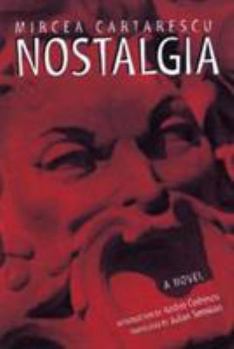Nostalgia
Mircea Cartarescu, born in 1956, is one of Romania's leading novelists and poets. This translation of his 1989 novel Nostalgia, writes Andrei Codrescu, "introduces to English a writer who has always had a place reserved for him in a constellation that includes the Brothers Grimm, Franz Kafka, Jorge Luis Borges, Bruno Schulz, Julio Cortazar, Gabriel Garcia Marquez, Milan Kundera, and Milorad Pavic, to mention just a few." Like most of his literary contemporaries of the avant-garde Eighties Generation, his major work has been translated into several European languages, with the notable exception, until now, of English.
Readers opening the pages of Nostalgia should brace themselves for a verbal tidal wave of the imagination that will wash away previous ideas of what a novel is or ought to be. Although each of its five chapters is separate and stands alone, a thematic, even mesmeric harmony finds itself in children's games, the music of the spheres, humankind's primordial myth-making, the origins of the universe, and in the dilapidated tenement blocks of an apocalyptic Bucharest during the years of communist dictatorship.
Readers opening the pages of Nostalgia should brace themselves for a verbal tidal wave of the imagination that will wash away previous ideas of what a novel is or ought to be. Although each of its five chapters is separate and stands alone, a thematic, even mesmeric harmony finds itself in children's games, the music of the spheres, humankind's primordial myth-making, the origins of the universe, and in the dilapidated tenement blocks of an apocalyptic Bucharest during the years of communist dictatorship.
Format:Paperback
Language:English
ISBN:0811215881
ISBN13:9780811215886
Release Date:November 2005
Publisher:New Directions Publishing Corporation
Length:361 Pages
Weight:1.00 lbs.
Dimensions:1.0" x 6.2" x 9.0"
Customer Reviews
2 ratings
FABULOUS BOOK!
Published by Thriftbooks.com User , 18 years ago
Cartarescu is, from my point of view, the most important Romanian prose writer alive. His prose is sweet and painful, structured and chaotic, erotic and anxious, subtle and funny. Many of his writings are filled with nostalgia, as he describes a Romania that does not exist anymore: the interbellic Romania or, in "Travesti", the spirit of the adolescent growing up in the communist Romania of the '60s and '70s. In 1986 I met Mircea Cartarescu as a teacher in what it was called at the time the "National Camp for Literary Creation". I was 14 years old and I was listening amazed to Mircea talking about solipsism, Borges and the "Theory of the Telescoped Worlds". At the time I (and many of those around me) had no clue who Mircea Cartarescu was, and even less who was he going to become. Only much later I realized how important in my intellectual and emotional (and, why not, sexual) development those Literary Camps were. Now, on January 13, 2007, I write these thoughts from my house in Berkeley, CA. After living for 7 years in the US, I became aware of the contrast between the depth and painful meaning of my Romanian communist adolescence, and the oblivious and meaningless life of the California adolescent. Both of them seem to me full of nostalgic hoplesness. (Apropos: daca Petruta citeste din intimplare rindurile astea, ar fi minunat daca ne-am putea reconecta. Peti, ai plecat acum 21 de ani din tabara de la Suceava mai devreme, si nu ai apucat sa imi dai adresa ta. Cit am regretat chestia asta!..) I would encourage the American readers not to be "put off" by some of the Publisher Weekly comments that the book is too postmodern for the american reader who prefers "realist fiction". These are the type of comments that keep the American reader unaware that there are many other things out there than those that the Publishers, Weekly, Monthly or Daily, want to sell them.
the best in romanian literature
Published by Thriftbooks.com User , 18 years ago
Read and you`ll never be sorry! A fantastic writer!





